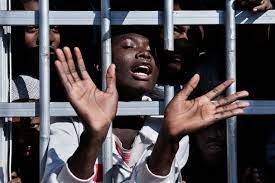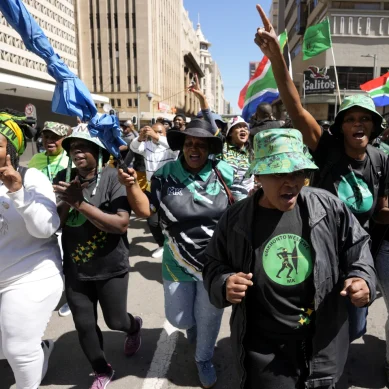
In 2018, journalist Sally Hayden received a message on Facebook from a refugee in a Libyan detention centre. “We need your help. We are under bad condition in Libya prison. If you have time, I will tell you all the story,” the message read, seemingly sent out of the blue.
It turned out that the man knew Hayden’s name because of an investigation she had conducted for The New Humanitarian earlier that year about allegations of corruption within the UN refugee agency’s resettlement programme in Sudan.
The contact lit a fuse for Hayden. She began what would become four years of in-depth reporting into the abuses being perpetrated against refugees, asylum seekers, and migrants in Libyan detention centres, exploring in particular how EU policies were helping to perpetuate this cycle of suffering. Hayden compiled the reporting into a book, “My Fourth Time, We Drowned: Seeking Refuge on the World’s Deadliest Migration Route”, published in March.
A year before the man reached out to Hayden from the detention centre, the EU and its member states had begun providing support to the Libyan Coast Guard to intercept refugees, asylum seekers, and migrants attempting to leave the country and reach Europe by crossing the Mediterranean Sea.
Since then, the EU’s policies, as well as the abuses they help facilitate, have been well documented by Hayden and others, including in our interactive explainer. But holding anyone accountable for the abuses or pressuring the EU to change course, have proved elusive.
“In the detention centres where people who are intercepted end up, there is not a proper registration system,” Hayden said. “We don’t know how many people are dying when they are returned to Libya. You cannot do a proper analysis of the consequences of European policies that support these interceptions and returns without that information, but it just isn’t being gathered.”
The New Humanitarian recently spoke to Hayden about the questionable roles the EU, UN agencies, and sometimes other aid organisations are playing in Libya, as well as the need for accountability and the importance of continuing to document the abuses being perpetrated.
This interview was edited for length and clarity.
The New Humanitarian: What is still poorly understood about the treatment of refugees, asylum seekers, and migrants in Libya?
Sally Hayden: What I was interested in when I started reporting on this was the effects of European policies – basically what the EU is deliberately doing to harden its own borders. In 2012, there was a European Court of Human Rights decision – the Hirsi decision – which said that European navy and coast guard boats cannot return refugees and migrants to Libya. The current policy of supporting the Libyan Coast Guard has evolved as a result of that decision. When I interviewed the EU’s border agency Frontex – which provides operational support to the Libyan Coast Guard – they told me that they do not monitor what happens after people are intercepted by the Libyan Coast Guard because Libya is a sovereign state.
We also know that in the detention centres where people who are intercepted end up there is not a proper registration system. There’s no list of who is inside. It’s a sign of the dysfunctionality of the Libyan state, but it is also deliberate. In detention centres, people get sold to traffickers, they pay their way out, they get sent out during the day as forced labour. Having a registration system would get in the way of being able to do that. People can go missing or even die without their names being noted down. We don’t know how many people are dying when they are returned to Libya. You cannot do a proper analysis of the consequences of European policies that support these interceptions and returns without that information, but it just isn’t being gathered.
In terms of EU funding, my reporting has showed that a lot of money from the EU Trust Fund for Africa – a multi-billion dollar pot of money established in 2015 and aimed, effectively, at stopping migration from across Africa – ends up supporting or empowering militias in various ways, which contributes to the dysfunctionality in Libya.
In my book, I write about being on a rescue ship off the Libyan coast, and I assumed that if we rescued people they would be refugees from various African countries who escaped detention centres. But instead, we rescued Libyans who said they were fleeing militias because the militias are just making the country unliveable.
The problems are massive, but I think there are a lot of questions to be asked about how specifically European Union anti-migration funding is making them worse.
- The New Humanitarian report











